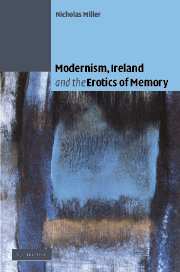Book contents
Introduction. All history is local: modernism and the question of memory in a global Ireland
Published online by Cambridge University Press: 22 September 2009
Summary
To give an accurate description of what has never occurred is … the proper occupation of the historian.
Oscar Wilde The Critic as ArtistIt may no longer be possible to speak and write of “Ireland.” Amid the vast cultural and economic shifts of the last decade, the Irish Republic has emerged as something unfamiliar: an international economic power asserting its political will on the European continent, marketing its own culture through a powerful indigenous film and media industry, and staking its claim to a high-tech manufacturing future powered by multinational corporate investment. It makes far more sense to speak now of a “global Ireland” as the country has become, for the first time in its history, a destination of choice not only for tourists but for job-seekers, investors, and international businesses selling everything from microchips to ketchup. The old familiar touchstones of Irish experience and identity have come to seem oddly dislocated in this context. It is not simply that “Kerry Gold” and other registered trademarks have displaced St. Patrick, shamrocks, and the color green as authentic signifiers of Irishness. After centuries spent in embattled pursuit of independence in its many elusive forms – economic prosperity, political autonomy, religious and geographic unification, historical atonement – Irish culture has quite suddenly begun to shed its identification with struggle as its principal and defining characteristic.
- Type
- Chapter
- Information
- Modernism, Ireland and the Erotics of Memory , pp. 1 - 18Publisher: Cambridge University PressPrint publication year: 2002



